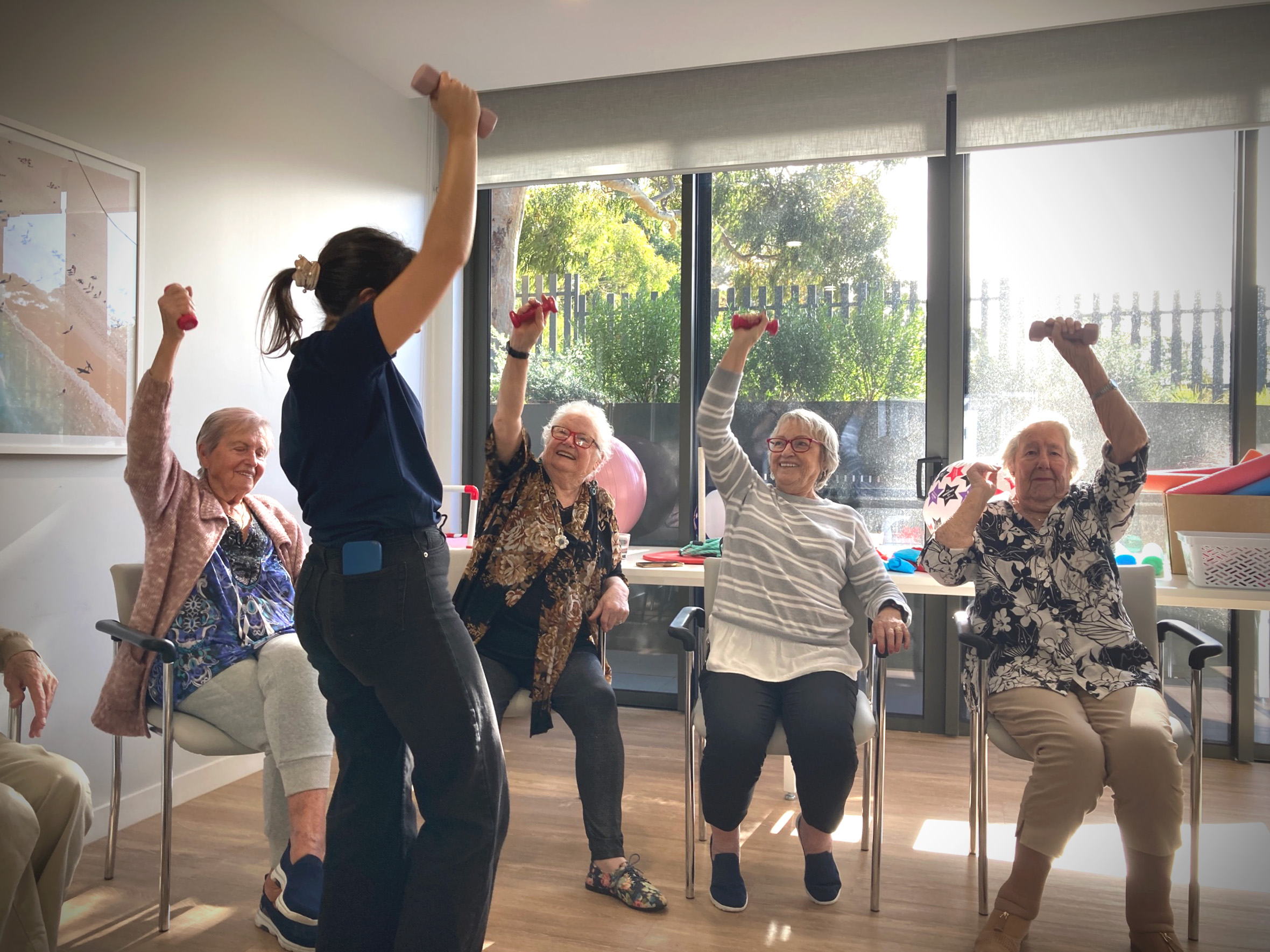From Sedentary to Active: Group Exercise for Older Adults
Cycle of inactivity
For residents in a care home, sedentary behaviour may lead to an increased risk of falls, incidence of pressure sores, contractures, cardiovascular deconditioning, urinary infections, and loss of independence. (need citation)
Reduced mobility can also have a great psychological impact as it increases dependency on others. This further affects opportunities to participate in daily social activities, which is the most consistent risk factor for depression in later life. (need citation)
Social isolation negatively impacts on mood and self-esteem, which can then further adversely affect physical health.
It creates a downward cycle that we, as physiotherapists, aim to break.
As a physiotherapist in aged care, our primary goal is to optimise functional independence and enhance the overall well-being of residents. We assess their mobility and function and encourage participation in therapy to maintain or improve them. It is our role to help residents minimise the effects of aging and the consequences of sedentary behaviour.
Evidence based practice
Recent studies have shown that physical activity provides positive benefits for medical conditions that greatly affect older adults:
Effects on Dementia:
In 2012, the World Health Organization declared dementia to be a public health priority (World Health Organization 2012), citing the high global prevalence and economic impact on families, communities, and health service providers. Exercise is one lifestyle factor that has been identified as a potential means of reducing or delaying progression of the symptoms of dementia. There is promising evidence that exercise programs may improve the ability to perform activities of daily living in people with dementia (citation).
Effects on Frailty:
Frailty is prevalent in older people and is characterised by decline across multiple body systems, causing decreased physiological reserve and increased vulnerability to adverse health outcomes. It is estimated that 21% of the community-dwelling population over 65 years are frail (citation). Frailty is independently predictive of falls, worsening mobility, deteriorating function, impaired activities of daily living, and death.
In people with frailty, high-certainty evidence shows mobility training improves mobility upon completion of the intervention period and the benefits can be seen up to six months post-intervention.
How are exercises classes for older adults beneficial?
Exercises classes are a great tool physiotherapists can use to reduce sedentary behaviour and target more than one goal at a time.
For people aged 65 years and over, it is recommended to complete 30 minutes of daily physical activity at a moderate intensity. Moderate intensity exercise should result in mild breathlessness, with the ability to still be able to talk comfortably.
We lead creative structured classes that last between 30-45 minutes with clear instructions and achievable goals.
These classes must incorporate exercises that are specifically designed to address the functional needs and abilities of older adults, with the idea to make it a fun and enjoyable social experience.
Our classes typically include:
- Warm up:
This section includes games and joint mobility exercises to not only prepare the body, but also to create a bond between therapist and participants whilst creating positive group morale. - Specific exercises:
This section of the class targets the specific goals of our participants with a focus on improving strength and endurance of the upper and lower limbs and at times even challenging standing balance.
- Cool down:
To conclude our sessions we look to include breathing techniques and flexibility exercises to try to return the body back to baseline releasing tension and stress.
Adding games and cognitive inputs help address the psychosocial health of the participants.
It is key to avoid monotony in group exercise classes, as we are trying to generate adherence and motivation through variety so we can provide a routine that leads to long-term health benefits. It is also key to provide progressions and regressions for each exercise to cater to the individual needs of everyone in the group.
Summary
In summary, group exercise classes led by a physiotherapist have significant benefits for elderly people:
1. Physical health: Regular participation in exercise classes can improve cardiovascular fitness, strength, flexibility, and balance.
2. Social interaction: Group classes provide an opportunity for elderly individuals to socialise and interact with others in a supportive and encouraging environment.
3. Cognitive stimulation: Following instructions, learning new movements, and coordinating different actions can challenge the brain and improve cognitive abilities.
4. Emotional well-being: Regular exercise has been shown to improve mood and reduce symptoms of anxiety and depression.
Additionally, the social support and positive interactions experienced in group settings can boost self-esteem and provide a sense of belonging.
References
Mobility training for increasing mobility and functioning in older people with frailty (Review) Treacy D, Hassett L, Schurr K, Fairhall NJ, Cameron ID, Sherrington C
Physical rehabilitation for older people in long-term care (Review) Crocker T, Forster A, Young J, Brown L, Ozer S, Smith J, Green J, Hardy J, Burns E, Glidewell E, Greenwood DC
https://www.healthdirect.gov.au/physical-activity-guidelines-for-older-adults
About the author
Aldana, a dedicated Physiotherapist at KEO Care, specialises in cardiopulmonary rehabilitation. After graduating in Argentina in 2018, she gained valuable experience in neuro settings for a year. Her passion for empowering older adults and preserving their independence led her to join the Age care team at KEO upon returning from her Australian travels. Aldana excels at building strong professional relationships with clients and fostering a vibrant workplace atmosphere. With pride, she applies her expertise and compassionate approach to positively impact the lives of older adults at KEO.
